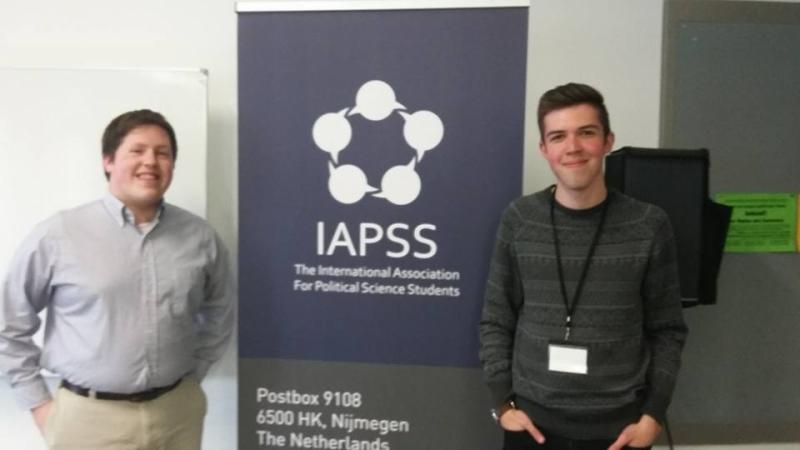April 11, 2016
Political Science Students Present at IAPSS World Conference in Berlin

Two political science majors, Max Mauerman and Ben Schumann, recently traveled to Berlin, Germany to present their research at the International Association of Political Science Students (IAPSS) World Conference. Their trip was funded in part by the Department of Political Science. Here they discuss their experience at the conference and the research that they presented.
Q: What is the IAPSS World Conference? How did you learn about this opportunity?
Ben: “The IAPSS World Congress is an international political science conference for both undergraduate and graduate students. The conference is held at a major European university annually; this year, it was at Humboldt University of Berlin. I learned about the conference through the Political Science department, and I knew I had to apply right away!”
Max: “I had the opportunity to present my senior thesis research this April at the International Association for Political Science World Congress, an academic conference for graduate and undergraduate political science students from around the world. This year's Congress was held in Berlin, Germany and brought more than 200 students. It's a truly international conference -- every continent (but Antarctica) was represented!”
Q: Please tell us about the research that you presented at the conference.
Ben: “I presented my undergraduate thesis work, entitled 'Donor Competition in Foreign Aid: The Results and Implications of States Receiving Aid from Rival Powers.' The thesis attempts to analyze the motivating factors of official development assistance donations from major states, with a focus on a dynamic of donor competition between the United States, the Russian Federation, and the People’s Republic of China.”
Max: “My main contribution to the conference was presenting my senior thesis on the relationship between social mobility and access to public transit. This was my first time presenting to an international audience and I got a lot of useful feedback that I had never heard before. In particular, it was interesting to hear the thoughts of local students from Berlin, as Germany has a completely different political structure for public infrastructure funding and Berlin consequently has one of the best public transit systems in the world (which I got to use extensively!).
I also had a chance to moderate a panel on political philosophy that focused on the intersection of cultural/religious identity and politics. Given the growing refugee crisis in Europe and the rise of the reactionary right, this was an especially relevant topic to the audience. I got to read and review a doctoral thesis that compared European and Israeli concepts of democracy, a paper about the legitimacy of popular resistance written by an Egyptian student, and more.”
Q: What was your favorite part of the experience?
Ben: “My favorite part of the experience was the opportunity to meet students from all over the world; there were a few other US students, but all continents except Antarctica were represented! The last night of the conference, we ate at an Italian restaurant with friends from Sweden, Ukraine, and Italy.”
Max: “In general, the most memorable part of the conference was just the sheer variety of perspectives represented. The theme of this year's World Congress was "Challenging Democracy", and it was fascinating to see how students from countries undergoing struggles with the meaning of democracy -- not just Europe but Nigeria, Taiwan, Nepal, Turkey and more -- interpreted this prompt. As one of the few US students there, I felt like I had a chance to represent not only Ohio State but also my country, and had many good conversations about US politics (both in- and outside of the conference). “
Q: What are some lessons or insights you have gained from this experience?
Ben: “I have learned that while day-to-day life in the US is not so different from the rest of the world, there are still cultural preferences that one must keep in mind. For instance, Germany is primarily a cash-based economy, and even in Berlin it is difficult to find a place that would take a credit card. From an academic standpoint, I found it interesting that political science is not taught in the same way worldwide; it seemed that on average, research from the Americas tended to focus on quantitative analysis, while European research was much more theoretical and philosophical.”
Q: Anything else you’d like to add?
Ben: “I am extremely grateful to the Departments of Economics and Political Science, as well as the College of Arts and Sciences, for the funding that made this trip possible!”
Max: “The organizers of the conference are looking to recruit more US students in the future, so I would absolutely recommend applying! The conference is always held in a historic European city (next year's will probably be in Budapest), and I had a fantastic time visiting Berlin.”

Max Mauerman and Ben Schumann are both senior Political Science and Economics double majors.
